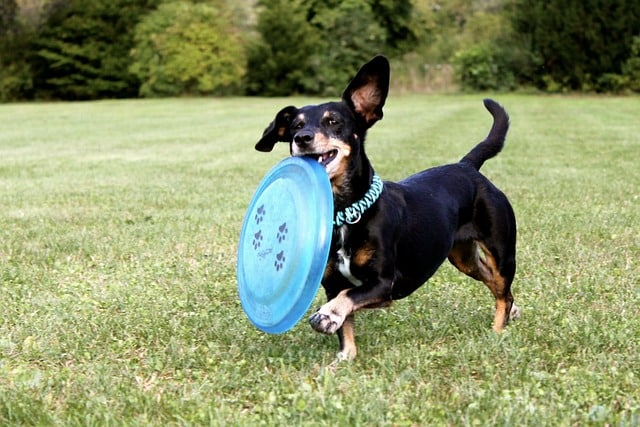

Dachshunds, affectionately known as “wiener dogs,” are celebrated for their playful personalities, loyalty, and unique elongated bodies. Their courage and lively nature make them beloved companions, but their distinct physical traits also predispose them to specific health concerns. As a devoted Dachshund parent, staying informed about common health issues can help ensure your furry friend lives a long, happy, and healthy life.
Intervertebral Disc Disease (IVDD)

Dachshunds are prone to IVDD due to their elongated spine, which makes them vulnerable to disc degeneration. Symptoms include reluctance to move, yelping in pain when touched, hind leg weakness, or even loss of bladder control. To prevent IVDD, limit jumping by using ramps for furniture, maintain a healthy weight, and provide moderate, non-strenuous exercise. Treatments range from rest and anti-inflammatory medications for mild cases to surgery and physical therapy for severe conditions.
Obesity

Obesity is a common issue in Dachshunds, as their small frames make them prone to weight gain, which exacerbates joint and back problems. Signs include noticeable weight gain, difficulty moving, and heavy breathing. Prevent obesity by feeding a portion-controlled, balanced diet, limiting treats, and ensuring regular daily exercise. Treatment involves switching to a vet-recommended weight-loss plan and creating a consistent exercise routine.
Dental Disease

Dental disease is prevalent in Dachshunds, with tartar buildup leading to gum infections and tooth loss. Watch for bad breath, swollen gums, and difficulty chewing. Prevent dental issues by brushing your dog’s teeth daily, offering dental chews, and scheduling annual cleanings. Treatment includes professional cleaning under anesthesia and, in severe cases, tooth extractions.
Progressive Retinal Atrophy (PRA)

PRA is an inherited eye condition that causes gradual vision loss in Dachshunds, with symptoms like trouble seeing in dim light and cloudy eyes. While PRA is not preventable, regular eye exams and maintaining a consistent home environment can help your dog adapt. While there’s no cure, antioxidants and verbal training can assist in managing vision loss.
Hip Dysplasia

Hip dysplasia in Dachshunds results from improper joint development, causing arthritis and difficulty moving. Symptoms include limping, stiffness, and reduced activity. Prevent hip issues by feeding joint-supporting nutrients, avoiding excessive exercise in puppies, and maintaining a healthy weight. Treatment may involve anti-inflammatory medications, supplements, or surgery for severe cases.
Epilepsy

Epilepsy, a neurological condition common in Dachshunds, is marked by recurring seizures, stiffening, and temporary disorientation. While not preventable, reducing stress and maintaining a healthy lifestyle can help manage the condition. Treatment often includes anticonvulsant medications and lifestyle adjustments to minimize triggers.
Patellar Luxation

Patellar luxation occurs when the kneecap slips out of place, causing limping and difficulty walking in Dachshunds. Prevent this by avoiding high-impact activities and keeping your dog at a healthy weight. Treatment options include physical therapy, anti-inflammatory medications, and surgery for severe cases.
Frequently Asked Questions (FAQs)

1. What is the best diet for a Dachshund?
A high-quality diet with lean proteins, healthy fats, and limited fillers is ideal. Choose food formulated for small breeds and avoid overfeeding to prevent obesity.
2. How much exercise does a Dachshund need?
Aim for 30–60 minutes of moderate exercise daily, including walks and playtime. Avoid strenuous activities that strain their back.
3. How often should I take my Dachshund to the vet?
Annual check-ups are essential, but senior Dachshunds or those with health conditions may require bi-annual visits.
4. Can I prevent IVDD in my Dachshund?
While genetics play a role, you can reduce risks with proper weight management, ramp use, and avoiding high-impact activities.
5. Do Dachshunds need joint supplements?
Joint supplements with glucosamine and chondroitin can be beneficial, especially for older Dachshunds or those showing early signs of joint issues.
6. What are the signs of a happy and healthy Dachshund?
A healthy Dachshund is playful, active, has a shiny coat, bright eyes, and a good appetite.
7. Are Dachshunds prone to allergies?
Yes, they can develop skin or food allergies. Watch for itching, redness, or digestive upset and consult a vet for allergy management.
8. How can I manage my Dachshund’s dental health?
Daily brushing, dental chews, and routine cleanings can help prevent dental disease.
9. What vaccinations does my Dachshund need?
Core vaccines include rabies, distemper, parvovirus, and adenovirus. Your vet may recommend others based on your location.
10. How do I know if my Dachshund is overweight?
You should be able to feel their ribs without pressing hard and see a visible waistline from above. If not, they may be overweight.
A Commitment to Dachshund’s Health and Happiness

Your Dachshund depends on your love and care to thrive. Regular vet visits, a balanced diet, and appropriate exercise tailored to their unique needs are key to preventing or managing common health issues. With proactive care and attention, your loyal companion can enjoy a joyful, active life by your side. Remember, while Dachshunds may face health challenges, their resilience and zest for life make every effort worth it. Together, you can ensure your beloved pet lives their healthiest and happiest life possible.
The post 7 Common Health Issues in Dachshunds and How to Prevent Them appeared first on iHeartDogs.com.
via Whisker Therapy